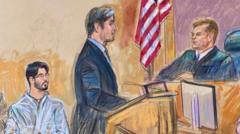Pope Leo XIV challenges the Catholic Church to engage in raising awareness about human dignity and emphasizes the need for charitable outreach.
**Pope Leo XIV Emphasizes Missionary Outreach and Commitment to the Poor in Inaugural Mass**

**Pope Leo XIV Emphasizes Missionary Outreach and Commitment to the Poor in Inaugural Mass**
In his first address as pontiff, Leo XIV asserts his dedication to the marginalized and the essence of missionary work.
---
In a significant moment for the Catholic Church, Pope Leo XIV took center stage, boldly declaring his commitment to "ordinary people" during his inaugural Mass as pontiff in the Sistine Chapel. This first homily solidified his stance against the elite and affluent, while advocating for missionary efforts to address the "wounds that afflict our society." Leo, previously Cardinal Robert Francis Prevost, marked his place in history as the first American pope, but cardinals expressed that his dedication to the ministry and service to the less fortunate outweighed any emphasis on his nationality.
As the congregation of cardinals listened intently, Leo invoked the teachings of his predecessor, Pope Francis, in addressing the pressing societal issues stemmed from a general decline in religious faith. He lamented that such a loss has led to "appalling violations of human dignity" worldwide. The new pontiff, reflecting on his extensive experience in Peru, echoed calls for "missionary outreach" that resonate with the urgency of his community's needs, thus aligning himself with the core message of compassionate church leadership.
Leo’s election had symbolic significance as it reflected a pivotal moment for the American Catholic Church, and his journey from a missionary in Peru to the leader of 1.4 billion Catholics was described by Cardinal Pablo Virgilio Siongco David of the Philippines as a blessing for migrants. He called for a church that learns from and sustains its ties with those it aims to serve, a sentiment many believe connects him to the progressive legacy of Pope Francis.
As discussions about the direction of the church loom, Leo XIV’s commitment to a more inclusive and participative church draws both hope and curiosity regarding how he will balance traditional doctrines with the revitalization of contemporary challenges. His pledge to uplift the marginalized stands as a notable commitment to the principles of social justice that have become vital under his papacy.
In Chiclayo, the region where Leo served as bishop, the local community celebrated, proudly claiming their "Peruvian pope." Residents fondly remember moments of his hands-on philanthropic work during crises, solidifying a bond that extends well beyond borders. This enthusiasm underscores the expectation that Leo's connection to the people, whether in Peru or beyond, will remain foundational to the unfolding narrative of his papacy.
With Leo XIV at the helm, the Catholic Church embarks on a new chapter, prompting essential discussions on how better to serve contemporary societal demands while keeping true to its religious foundations. As he embarks on this journey, the emphasis on collective responsibility and community leadership could redefine how the Church both contributes to and draws from the very society it exists to uplift.
In a significant moment for the Catholic Church, Pope Leo XIV took center stage, boldly declaring his commitment to "ordinary people" during his inaugural Mass as pontiff in the Sistine Chapel. This first homily solidified his stance against the elite and affluent, while advocating for missionary efforts to address the "wounds that afflict our society." Leo, previously Cardinal Robert Francis Prevost, marked his place in history as the first American pope, but cardinals expressed that his dedication to the ministry and service to the less fortunate outweighed any emphasis on his nationality.
As the congregation of cardinals listened intently, Leo invoked the teachings of his predecessor, Pope Francis, in addressing the pressing societal issues stemmed from a general decline in religious faith. He lamented that such a loss has led to "appalling violations of human dignity" worldwide. The new pontiff, reflecting on his extensive experience in Peru, echoed calls for "missionary outreach" that resonate with the urgency of his community's needs, thus aligning himself with the core message of compassionate church leadership.
Leo’s election had symbolic significance as it reflected a pivotal moment for the American Catholic Church, and his journey from a missionary in Peru to the leader of 1.4 billion Catholics was described by Cardinal Pablo Virgilio Siongco David of the Philippines as a blessing for migrants. He called for a church that learns from and sustains its ties with those it aims to serve, a sentiment many believe connects him to the progressive legacy of Pope Francis.
As discussions about the direction of the church loom, Leo XIV’s commitment to a more inclusive and participative church draws both hope and curiosity regarding how he will balance traditional doctrines with the revitalization of contemporary challenges. His pledge to uplift the marginalized stands as a notable commitment to the principles of social justice that have become vital under his papacy.
In Chiclayo, the region where Leo served as bishop, the local community celebrated, proudly claiming their "Peruvian pope." Residents fondly remember moments of his hands-on philanthropic work during crises, solidifying a bond that extends well beyond borders. This enthusiasm underscores the expectation that Leo's connection to the people, whether in Peru or beyond, will remain foundational to the unfolding narrative of his papacy.
With Leo XIV at the helm, the Catholic Church embarks on a new chapter, prompting essential discussions on how better to serve contemporary societal demands while keeping true to its religious foundations. As he embarks on this journey, the emphasis on collective responsibility and community leadership could redefine how the Church both contributes to and draws from the very society it exists to uplift.


















